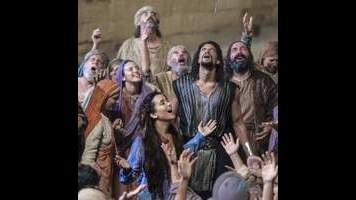The Dovekeepers tells a muddled Bible story from the female perspective

If history is truly written by the victors, it makes sense that men get all of the glory in biblical-era tales. So what does it say that more ancient women are having their story told now? Historical fiction has been tackling the other side of these women for some time, and now television has adapted these stories as well. Lifetime tackled Anita Diamant’s The Red Tent with a miniseries chronicling the Old Testament through Dinah. This was preceded by a special on the women of the Bible, courtesy of the married powerhouses of faith-based television programming, Touched By An Angel actress Roma Downey and producer Mark Burnett.
Downey and Burnett hit surprise ratings gold with The Bible, a 10-hour miniseries covering the Old Testament, making their new adaptation of Alice Hoffman’s The Dovekeepers a logical step. And The Dovekeepers isn’t their only biblical show ready for primetime. NBC will feature A.D.: The Bible Continues (was The Bible II: Judgment Day too cliche?) on Easter Sunday. (Another biblical rendering, National Geographic’s Killing Jesus, aired March 29.)
Shot on location in gorgeous Malta, The Dovekeepers centers around Shirah (former NCIS favorite Cote De Pablo) and Yael (House Of Cards’ Rachel Brosnahan), survivors of the siege of Masada by the Romans. As the story goes (as did the Peter O’Toole-starring miniseries of the early ’80s), the Jews of Masada refused to pay homage to their Roman conquerors, leading to their deaths, apocryphally, because of a mass suicide. The women tell their story through Flavius Josephus (Sam Neill), whose one purpose seems to be to interrupt Shirah and Yael, constantly scolding them for their out-of-wedlock dalliances and their decision to choose faith over safety.
That debate is the crux of The Dovekeepers in Burnett and Downey’s purview, and the story of Masada as a whole. For some, Masada is a symbol of religious resilience, with the faithful choosing death over enslavement, becoming a pilgrimage site since it was excavated in the ’60s. For others, it is a cautionary tale about the dangers of extremism. The residents of Masada are where the word “zealot” comes from, after all. Burnett and Downey have positioned The Dovekeepers to paint Shirah and Yael as passionate heroines, while Flavius Josephus comes off as a smug traitor to his faith (Shirah reveals Flavius Josephus is Jewish, who bowed down to the Romans to save his own life).
It’s not the stance of The Dovekeepers that is inherently problematic (if only because the audience is likely to agree with it), but how the story is told. As Shirah and Yael tell their story to Flavius Josephus, the audience sees their experience through flashbacks, from their meeting when Yael was a neglected child with only Shirah to care for her, to their reunion years later in Masada, with both assuming their roles of the title. (The Shirah of the miniseries is an amalgam of two very different characters from the book, making her more muddled than Yael.) This type of as-told-to storytelling works well in literature, but it hampers The Dovekeepers, as Flavius Josephus constantly breaks into the story to chastise these women for their choices, killing momentum to insert a stark point of view into the text. Flavius Josephus was a historical figure who documented the siege, but in The Dovekeepers he acts as more of a symbol than a character, which doesn’t make for particularly good storytelling.
Flavius Josephus’ position in The Dovekeepers would perhaps be even more egregious if any of the other characters were fully drawn, but they aren’t. The two main women, along with Shirah’s daughter Aziza (Kathryn Prescott), are the most realized characters, but appear more propelled by romantic affinities than their faith. In their quest to bring these faith-based stories to the small screen, Burnett and Downey also understand the need to make entertaining television. There’s sex and violence galore, and while the story gives a reason for the blood, the sex takes the place of any kind of depth in the relationships between the women and the men they love. Shirah speaks of her intense love for charismatic (married) leader Eleazar Ben-Ya’ir (Mido Hamada), but all he amounts to is someone she looks at longingly from afar. When Flavius Josephus questions why these women would risk their lives, and the lives of their children, their declarations of undying love fall flat. Why would they risk death for these guys? That’s a question left largely unanswered.